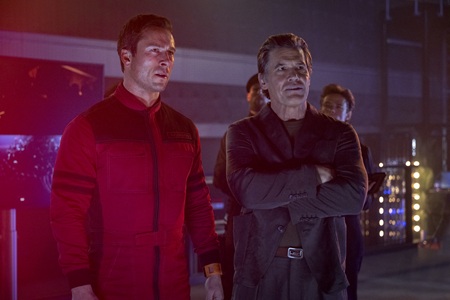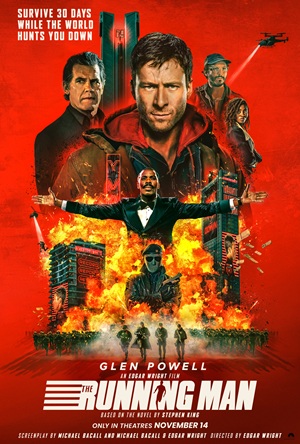
Wright’s The Running Man Fails to do Justice by King’s 1980s Survivalist Game Show Source Material
As far as wasted potential goes, The Running Man vaults right near the top of the 2025 frustrating misfire list. Early on, director Edgar Wright’s adaptation of author Stephen King’s source material (writing under his Richard Bachman pseudonym) hits several high notes. The dystopian setting is beautifully realized, and the blunt social commentary is craftily on point. A game Glen Powell is well cast as everyman hero Ben Richards, while a charismatically smarmy Josh Brolin is at his Machiavellian best as duplicitous television game show executive Dan Killian. The early action scenes balance violence and humor with the same satirical panache that Wright brought to his 2007 cult favorite Hot Fuzz.
But as quickly as this second variation on King’s scenario (the first being the cartoonishly goofy 1987 fan-favorite adaptation starring Arnold Schwarzenegger, Maria Conchita Alonso, and a superb Richard Dawson) made a positive impression, it just as suddenly raced downhill. The overall lack of subtlety becomes assaultive. Powell’s performance loses its charismatic joie de vivre and ventures into the realm of the annoyingly insufferable. The entire climax falls flat, crashing to earth with a massive thud that cratered out any and all remaining goodwill I may have still had. At a certain point, I went from broadly smiling to wanting to angrily throw things at the screen.
I do appreciate that Wright and his frequent writing collaborator Michael Bacall make at least a passing attempt to remain as true as possible to King’s novel, at least far more than the bombastically macho Schwarzenegger version does. This examination of a United States overrun in fascist ideology, corporate malfeasance, and capitalistic excess, almost all of it fueled by fictitious propaganda broadcast into homes via state-run media, is arguably more eerily disquieting now than it was when first published in 1982. The rise of reality television, privatized journalism, and billionaire autocracy is astutely on-the-nose, and Wright isn’t playing around in his cavalier depiction of any of it.
Yet, none of that means anything. Unlike the haunting magnetic gravitas of director Francis Lawrence’s The Long Walk, also release into theaters this year, precious little about what Wright is doing here makes a lasting impression. Theres plenty of bang and boom but little in the way of emotion, insight, or consequence. Even if the film initially talks a good game, as soon as the stakes reach their zenith the director begins to pull all of his punches, almost as if Wright is channeling his inner Robert Ryan in 1949’s boxing melodrama The Set-Up and is being paid to take a dive.
But, unlike that film’s protagonist, Bill ‘Stoker’ Thompson, the director doesn’t have a change of heart or try to redeem himself. Instead, he falls face-first into the mat. Everyone watching and sitting in the audience is being played for a sucker, especially if they initially believe the usually reliable Wright has something worthwhile he wants to say.
In a not-so-distant future, the American government has all but collapsed, and an all-powerful corporation that controls the airwaves has taken firm control of society. While the wealthy elite minority live their lives in continual comfort, the majority of society is barely eking by. Healthcare costs are out of this world, and looking out for your neighbor’s well-being is more than enough to get someone ousted from any type of reasonably well-paying work.
What can the downtrodden masses do? They can compete in a never-ending stream of popular game show competitions, almost all of which run the risk of permanent injury. The most popular, and by far the most lethal, is the appropriately-named survival showcase “The Running Man.” As if they were ancient Roman gladiators willingly sacrificing themselves at the altar of Richard Connell and his most dangerous game, contestants must survive being hunted for 30 days and, if they do, will win themselves a billion-dollar grand prize.
Richards, a blue-collar worker with anger management issues, is a strong leader who has been blacklisted by the country’s television network overlords for reasons ranging from attempted workplace unionization, to selflessly rescuing his coworkers from tragic disaster. With a sick child in desperate need of medication sitting at home, he is convinced by the fast-talking Killian to be the latest contestant on “The Running Man.” Not too surprisingly, nothing goes as planned.
An early escape sequence inside (and out) of a rundown four-story hotel complex is beautifully handled, Wright delivering a rhapsodic series of death-defying escapes, near misses, and massive explosions with energetic bravado. Things slowly fall apart from there, and although the director does still have a handful of imaginative tricks up his sleeve, none of them are good enough to mitigate the calamitous downturn events start to take. By the time Michael Cera showed up as a rambunctious revolutionary eager to give Richards an assist, I barely cared anymore about anything that was happening, and it only got worse from there.
The whole ending sequence is an unendurable waste of time. Lee Pace, playing the lead corporate assassin McCone, eager to slice off Richard’s scalp, gets nothing interesting to do. Colman Domingo (as “The Running Man” host Bobby T), Katy O’Brian (as fellow contestant Jenni Laughlin), and Emilia Jones (as a scared motorist who Richards initially utilizes as hostage to get him out of a televised jam) are each wasted, the latter pushed into a corner of contrived coincidence and frustrating narrative subterfuge that would be disgusting if it wasn’t so meaningless.
Look, I’m not going to try and make the case that the Schwarzenegger version is any sort of masterpiece, but at least it has the strength of its goofy ’80s actioner convictions. Wright aims higher with his version of The Running Man, a lot higher, but comes so woefully short of hitting the mark I almost wondered if he was the victim of some behind-the-scenes tinkering that softened his vision and plucked out its teeth one molar at a time. While I don’t think that was the case, the truth is that his adaptation is an unvarnished waste of time and talent. I say change the channel and go watch something else.
Film Rating: 1½ (out of 4)








